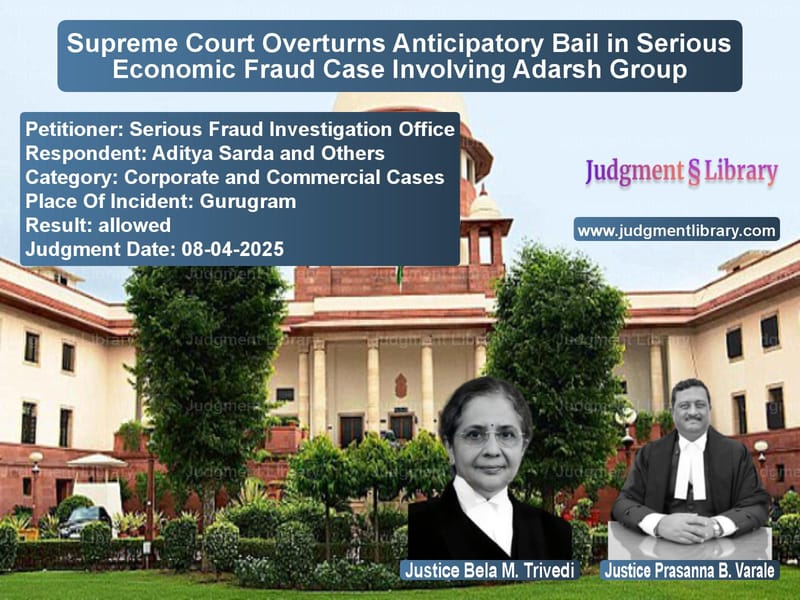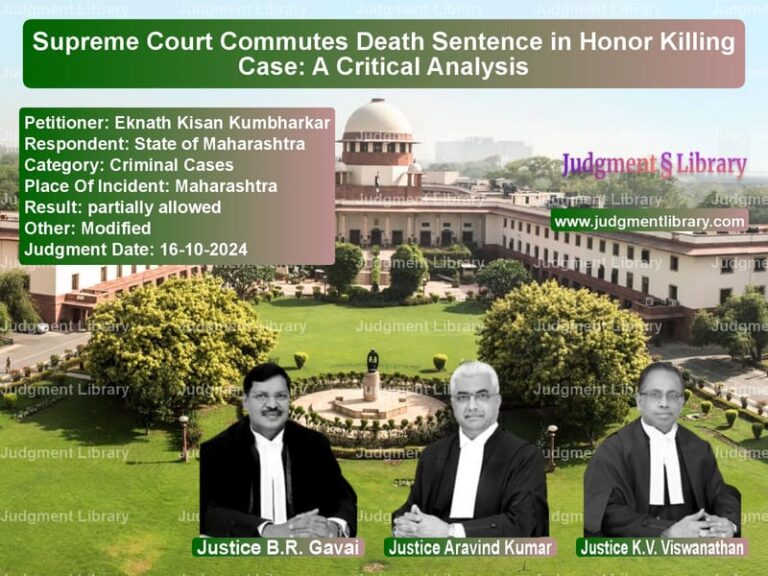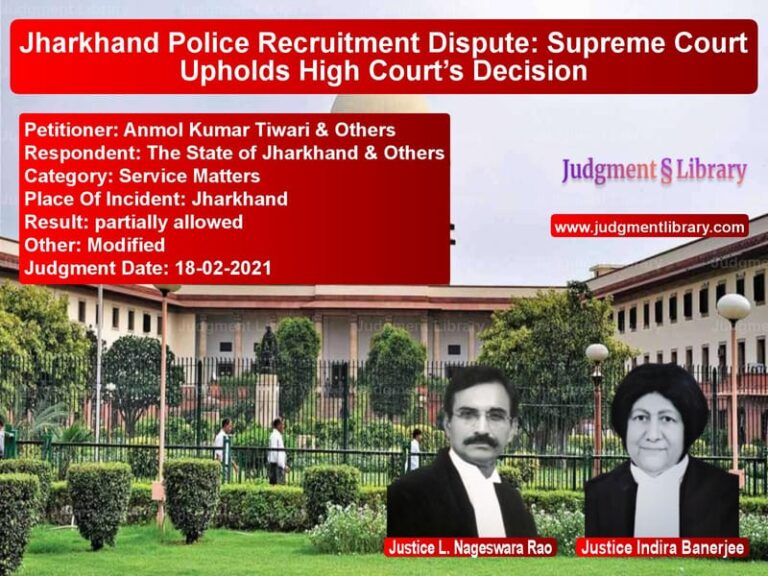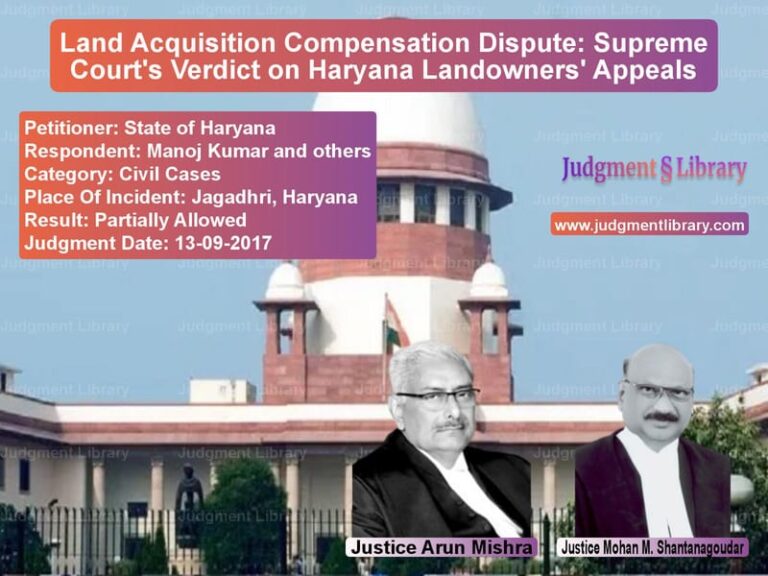Supreme Court Overturns Anticipatory Bail in Serious Economic Fraud Case Involving Adarsh Group
The Supreme Court of India recently delivered a significant judgment in a series of interconnected criminal appeals arising from the Adarsh Group fraud case. The case, which involves allegations of large-scale financial irregularities and siphoning of public funds, highlights the judiciary’s stern stance against economic offenses and the misuse of legal processes to delay trials.
The judgment, authored by Justice Bela M. Trivedi and concurred by Justice Prasanna B. Varale, sets aside anticipatory bail granted by the High Court to several accused persons who were allegedly involved in a massive financial fraud. The Court emphasized that economic offenses constitute a class apart and need to be dealt with strictly, especially when accused persons attempt to evade the legal process.
The case originated from investigations conducted by the Serious Fraud Investigation Office (SFIO) into the affairs of 125 companies belonging to the Adarsh Group. The SFIO’s investigation revealed that Adarsh Credit Cooperative Society Limited (ACCSL), a multi-state credit cooperative society, had illegally loaned approximately Rs. 4,120 crores to its own group companies and other entities, violating established norms that prohibit such transactions.
Justice Trivedi, in her judgment, made several crucial observations about the nature of economic offenses and the importance of maintaining the integrity of judicial processes. The Court noted: “Economic offences constitute a class apart and need to be visited with a different approach in the matter of bail. The economic offences having deep-rooted conspiracies and involving huge loss of public funds need to be viewed seriously and considered as grave offences affecting the economy of the country as a whole and thereby posing serious threat to the financial health of the country.”
The judgment meticulously details how the accused persons, despite being aware of the proceedings against them, repeatedly avoided appearing before the Special Court in Gurugram. The Court observed that the respondents had filed anticipatory bail applications before the Special Court, which were rejected, yet they continued to evade the legal process. This conduct, according to the Supreme Court, amounted to interference with the administration of justice.
One of the key legal issues addressed in the judgment was the interpretation of Section 212(6) of the Companies Act, 2013, which makes offenses under Section 447 (punishment for fraud) cognizable and imposes stringent conditions for granting bail. The Court emphasized: “These twin conditions are mandatory in nature… they are applicable even in the anticipatory bail proceedings.” The Court found that the High Court had completely ignored these mandatory conditions while granting anticipatory bail to the accused.
The Supreme Court also dealt with the argument that the Special Court should have issued summons instead of warrants. Rejecting this contention, the Court held: “As per Section 204, Cr.P.C. in a complaint case, which appears to be a warrant case, the Court taking cognizance of the offence, has the discretion to issue warrant or summons as it thinks fit… There cannot be a strait jacket formula that the Court must first issue a summons even in case of a warrant case, irrespective of the gravity or seriousness of the offence.”
In its concluding remarks, the Supreme Court made strong observations about the conduct of the accused: “The respondents-accused, who have continuously avoided to follow the due process of law, by avoiding attendance in the Court, by concealing themselves and thereby attempting to derail the proceedings, would not be entitled to the anticipatory bail. If the Rule of Law is to prevail in the society, every person would have to abide by the law, respect the law and follow the due process of law.”
The judgment sets aside the High Court’s orders granting anticipatory bail and directs the accused to surrender before the Special Court within one week. The Court clarified that it has not expressed any opinion on the merits of the case and that the Special Court would be free to consider bail applications in accordance with law.
This judgment reinforces the Supreme Court’s consistent position that economic offenses require a different approach in bail matters, especially when accused persons show disregard for the judicial process. It serves as a reminder that the courts will not tolerate attempts to obstruct justice through deliberate evasion of legal proceedings.
Petitioner Name: Serious Fraud Investigation Office.Respondent Name: Aditya Sarda and Others.Judgment By: Justice Bela M. Trivedi, Justice Prasanna B. Varale.Place Of Incident: Gurugram.Judgment Date: 08-04-2025.Result: allowed.
Don’t miss out on the full details! Download the complete judgment in PDF format below and gain valuable insights instantly!
Download Judgment: serious-fraud-invest-vs-aditya-sarda-and-oth-supreme-court-of-india-judgment-dated-08-04-2025.pdf
Directly Download Judgment: Directly download this Judgment
See all petitions in Company Law
See all petitions in Corporate Governance
See all petitions in Fraud and Forgery
See all petitions in Bail and Anticipatory Bail
See all petitions in Money Laundering Cases
See all petitions in Judgment by Bela M. Trivedi
See all petitions in Judgment by Prasanna Bhalachandra Varale
See all petitions in allowed
See all petitions in supreme court of India judgments April 2025
See all petitions in 2025 judgments
See all posts in Corporate and Commercial Cases Category
See all allowed petitions in Corporate and Commercial Cases Category
See all Dismissed petitions in Corporate and Commercial Cases Category
See all partially allowed petitions in Corporate and Commercial Cases Category







